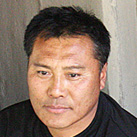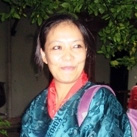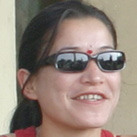Future Generations University Alumni
 LHENDUP UGYEN, CLASS OF 2014
LHENDUP UGYEN, CLASS OF 2014Practicum Summary: Building Comunity Collaboration in Watershed Rehabilitation in Chendona Village, Paro, Bhutan
Ugyen’s research practicum focuses on the problems associated with watershed degradation in the Chendona Village of the Paro district of Bhutan, which include a lack of drinking water, inability to practice sanitation, agricultural fields unfit for farming, and food and income insecurity. The contributing factors to the water shortage problems in Bhutan are associated with human impact and climate change, and include watershed degradation, over-harvesting which results in excessive runoff, wild fires, the country’s topography, terrain, and changes in precipitation. Chedona Village was chosen as the research site due to the community’s experience with water shortages. Until recent decades, the community had practiced a sustainable forestry management system through communal forest management and private forestry which maintained the health of the surrounding watershed and the small streams within it used for drinking water. In order to identify solutions to the water shortage crisis and initiate interventions to improve the situation, Ugyen conducted a community consultation meeting, household surveys, field observations, report presentations, and focus group discussions in the Community of Chendona. In his results, Ugyen recommended mass community replantation projects to allow the absorption of run-off into the groundwater, the creation of conservation policies with input from locals, community awareness and education workshops, and the implementation of community-based participatory by-laws to control legal and illegal logging in critical watershed areas.
 RABTEN SONAM, CLASS OF 2014
RABTEN SONAM, CLASS OF 2014Practicum Summary: Studying Effectiveness and Sustainability of Sawmill and Wood-Based Industries in Thimphu, Bhutan
In his research practicum, Sonam explores the sustainability of wood-based industries and supply and demand market regulation in Thimphu, Bhutan. Although there is strong political will to protect Bhutan’s 72.5% forest cover, fast population growth, developmental activities, and the resulting demand for timber fuel challenges the likelihood of forest protection in the future. In Bhutan, per capita wood consumption is relatively higher than that of neighboring countries, with 95% of households reliant on timber for lighting, heating, and cooking. In his study, Rabten found that there is an excessive amount of waste in the processing of timber at sawmills. In order to reduce waste in sawmills and therefore decrease logging activities, Sonam recommends training sawmill workers in new waste-reducing practices, investing in new, more efficient technologies, repurpose wasted wood offcuts, producing byproducts such as briquettes, and involving all stakeholders in policy making and decision making about timber production.
 LHAMTSHOK TSERING, CLASS OF 2009
LHAMTSHOK TSERING, CLASS OF 2009Practicum Summary: NeomicrocalamusAndropogononifolius in Kangpara, Bhutan
TsheringLham’s study concerns the depletion of Neomicrocalamusandropogonifolius, also known as ringshu bamboo, in Kangpara, located in the eastern district of Trashigang, Bhutan. Communities in this region use ringshu to create fine bamboo products to sell in urban markets, but they must travel further and further away from their villages to find materials for their work. Using ground field surveys, social and economic data, and an analysis of local perception and government policies, Lham assessed the factors that contributed to the decline of the ringshu population in local forests. Ultimately, she found that a lack of local institutions, a gap in forest policies and implementation, limited scientific scientific and technical knowledge and skills in sustainably managing ringshu, contributed to the profound decline in the ringshu population in local forests.
 TSHERING YANGZOM, CLASS OF 2007
TSHERING YANGZOM, CLASS OF 2007Practicum Summary: Ja Thungay: Let’s Drink Tea
Tangzon’s practicum examines the relationship between alcohol and poverty in one of Bhutan’s poorest rural indigenous communities, the Lhops, located in the south-western region of the country. For years, the Tarayana Foundation, founded by Her Majesty the Queen of Bhutan, has focused on improving the Lhop community’s living standards through skills training programs, educational scholarships for children, and providing maintenance fees so that the poor may fend for themselves. In Yangzom’s research, she discovered that while economic opportunities were accessible to the Lhops community, many of them were still heavily dependent on alcohol, especially men. She sites’ many contributing factors to this dependence, including the lack of access to a road, which inhibits opportunities for community members to buy, sell, and trade. Yangzom also analyzes whether women could be used as a force to bring about social change in the community in a bottom-up approach to prevent and mitigate alcohol-related problems by using information, education, and communication in hopes that individuals will change their behavior. Yangzom recommends focusing on changing socio-cultural norms about gender and drinking while remaining sensitive to the Lhop culture. She also sites the importance of carrying out this approach in a sensitive and serious way, in which the community is involved in every step of improvement, due to the fact that the community has already been patronized by surrounding communities for their problems with alcohol and productivity.

